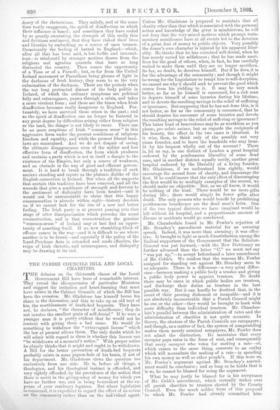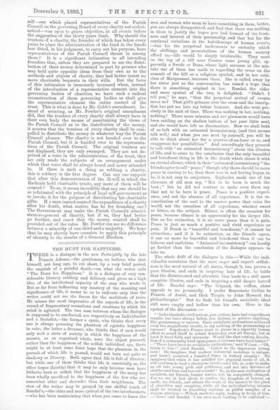THE PARISH COUNCILS BILL AND LOCAL CHARITIES. T HE debates on
the thirteenth clause of the Local Government Bill have been of remarkable interest. They reveal the idiosyncrasies of particular Ministers and suggest the irritation and heart-burning that must have arisen in the Cabinet Councils of which the Bill has been the occasion. Mr. Gladstone has himself borne his share in the discussion, and this to take up an old text of his, the worthlessness of death-bed bequests. They have not, he declares, "the character of munificence ; they do not involve the smallest grain of self-denial." If he were a younger man it is pretty evident that he would not be content with giving them a bad name. He would do something to withdraw the "extravagant license" which the law at present allows them. The only doubt which he will admit with regard to them is whether this license can "be withdrawn at a moment's notice." With proper notice he plainly thinks that it might and ought to be withdrawn. A Bill for the better prevention of death-bed bequests probably exists in some pigeon-hole of his brain, if not of his department. Mr. Gladstone views the question too exclusively from one side. He is, before all things, a theologian, and his theological instinct is offended, and very rightly offended, by the prevalence of the notion that there is merit in the giving-away of money for which you have no further use, and in being benevolent at the ex- pense of your residuary legatees. But where legislation is concerned, it is expedient to regard the effect of an action on the community rather than on the individual agent. Unless Mr. Gladstone is prepared to maintain that all charity other than that which is associated with the personal action and knowledge of the giver is mischievous, he will not deny that the very mixed motives which prompt testa- mentary munificence have at all events led to the devotion of a great deal of money to public objects. Very possibly the donor's own character is injured by his apparent liber- ality. He thinks that he has exercised self-denial, when he has merely varied his selfishness ; that he has made sacri- fices for the good of others, when, in fact, he has carefully waited to make them until they are no longer sacrifices. So far, no doubt, he deceives himself. But if he does, it is for the advantage of the community ; and though it might be wrong for the Legislature to tempt him to self-deception, we cannot see why it should seek to prevent the good which comes from his yielding to it. It may be very much better, so far as he himself is concerned, for a rich man to deprive himself of some luxuries during his lifetime, and to devote the resulting savings to the relief of suffering or ignorance. But supposing that he has not done this, is it not better, so far as the community is concerned, that he should deprive his successor of some luxuries and devote the resulting savings to the relief of suffering or ignorance ? This latter kind of benevolence may be as worthless as you please, pro salute minim, but as regards the recipients of his bounty, the effect in the two cases is identical. Is it wise, then, to think only of the possibly not very pious founder, and to leave the hundreds who may bene- fit by his bequest wholly out of the account ? There is, let us say, in one district of London a great hospital endowed by the posthumous liberality of some dead man, and in another district equally needy, another great hospital endowed by the liberality of a living founder. Mr. Gladstone, if we understand him rightly, would encourage the second form of charity, and discourage the first. If he could insure that the only effect of discouraging the first would be to multiply examples of the second, we should make no objection. But, as we all know, it would be nothing of the kind. There would be no more gifts during life ; there would simply be fewer gifts after death. The only persons who would benefit by prohibiting posthumous beneficence are the dead man's heirs. One of the two typical districts we have imagined would be left without its hospital, and a proportionate amount of disease or accidents would go unrelieved.
Mr. Chamberlain found in Mr. Fowler's rejection of Mr. Strachey's amendment material for an amusing speech. Indeed, it was more than amusing ; it was effec- tive. It brought to light so much dissatisfaction among the Radical supporters of the Government that the Solicitor- General was put forward,—with the New Dictionary no further advanced than the letter "C," we must not say "was put up,"—to accept beforehand a later amendment of Mr. Cobb's. We confess that the reasons Mr. Fowler assigned for standing out against Mr. Strachey seem to us adequate. There is a difference—a very great differ- ence—between making a public body a trustee and giving a public body power to appoint trustees. No doubt there may be cases in which public bodies are trustees, and discharge their duties as trustees in the best possible way. But it can hardly be doubted that, in the event of their proving dishonest or incapable—and it is not absolutely inconceivable that a Parish Council might be one or the other—they would be brought to book with more difficulty than individual trustees. Mr. Chamber- lain's parallel between the administration of rates and the administration of charities is not quite accurate, In theory, the electors of the Parish Councils are ratepayers ; and though, as a matter of fact, the system of compounding makes them merely nominal ratepayers, Mr. Fowler does not admit the distinction. He maintains that every occupier pays rates in the form of rent, and. consequently that every occupier who votes for making a rate—or, which comes to the same thing, consents to an outlay which will necessitate the making of a rate—is spending his own money as well as other people's. If this were so, Mr. Fowler's argument against Mr. Strachey's amend- ment would be conclusive ; and so long as he holds that it is so, he cannot be blamed for using the argument.
What be may justly be blamed for is his acceptance of Mr. Cobb's amendment, which virtually makes over all parish charities to trustees elected by the County Council. Even the much milder form of this proposal to which Mr. Fowler had already committed him- self—one which placed representatives of the Parish Council on the governing Board of every charity not ecclesi- astical—was open to grave objection, at all events before the suggestion of the thirty years limit. Why should the trustees of a charity, the founder of which has taken every pains to place the administration of the fund in the hands best fitted, in his judgment, to carry out his purpose, have representatives of the Parish Council thrust in among them P It is a significant intimation to all intending founders that, unless they are prepared to see the distri- bution of their money determined in part by persons who may hold quite opposite ideas from their own as to the methods and objects of charity, they had better insert no more charitable bequests in their wills. But the force of this intimation is immensely increased when, instead of the introduction of a representative element into the governing bodies of charities, we have such a radical reconstruction of these governing bodies as shall give the representative element the entire control of the trust. This is what is done by Mr. Cobb's amendment. In- stead of securing, as Mr. Fowler's original amendment did, that the trustees of every charity shall always have in their own body the means of ascertaining the views of the Parish Council as to the distribution of the money, it secures that the trustees of every charity shall be com- pelled to distribute the money in whatever way the Parish Council pleases. The charity is not handed over to the Parish Council, but it is handed over to the representa- tives of the Parish Council. The original trustees are not displaced, they are only swamped. They are not de- prived of a voice in the administration of the trust, they are only made the subjects of an arrangement under which that voice shall be always heard and never attended to. i If there is such a thing as robbing a charity, this s robbery in the first degree. Can any one suppose that after this demonstration of the ill-will in which the Radicals hold charitable trusts, any more of them will be created P To us, it seems incredible that any one should be so infatuated with the principle of local self-government as to invoke it for the purpose of distributing his charitable gifts. If a man cannot control the expenditure of a charity after his death, what motive has he for founding one P The Government may make the Parish Councils admini- strators-general of charity, but if so, they had better go further, and enact that the money wanted shall be provided out of the rates. Mr. Fowler can see no difference between a minority of one-third and a majority. We hope that he may shortly have occasion to apply this principle of identity to the results of a General Election.







































 Previous page
Previous page